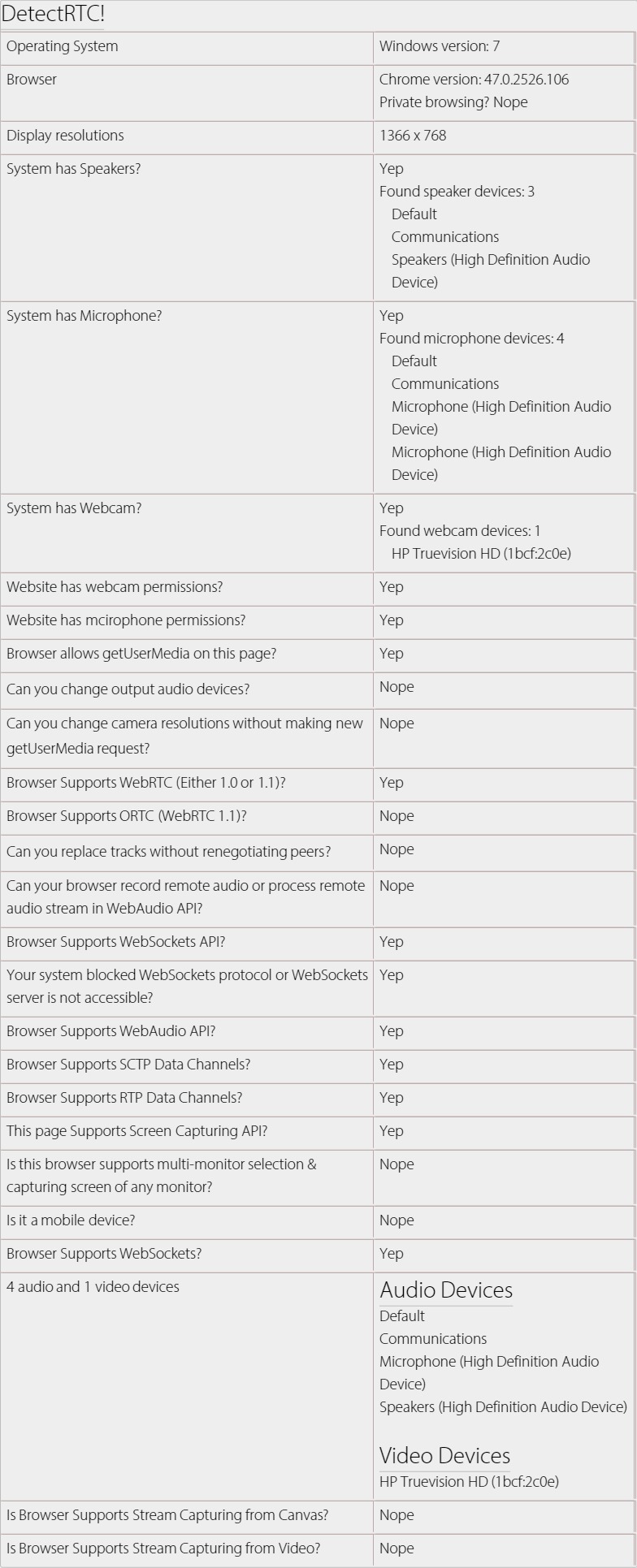Live Demo: https://www.webrtc-experiment.com/DetectRTC/
if (DetectRTC.isWebRTCSupported === false) {
alert('Please use Chrome or Firefox.');
}
if (DetectRTC.hasWebcam === false) {
alert('Please install an external webcam device.');
}
if (DetectRTC.hasMicrophone === false) {
alert('Please install an external microphone device.');
}
if (DetectRTC.hasSpeakers === false && (DetectRTC.browser.name === 'Chrome' || DetectRTC.browser.name === 'Edge')) {
alert('Oops, your system can not play audios.');
}A tiny JavaScript library that can be used to detect WebRTC features e.g. system having speakers, microphone or webcam, screen capturing is supported, number of audio/video devices etc.
It is MIT Licenced, which means that you can use it in any commercial/non-commercial product, free of cost.
npm install detectrtc --production
# or via "bower"
bower install detectrtc
DetectRTC.isSetSinkIdSupported // (implemented)
DetectRTC.isRTPSenderReplaceTracksSupported // (implemented)
DetectRTC.isORTCSupported // (implemented)
DetectRTC.isRemoteStreamProcessingSupported // (implemented)
DetectRTC.isWebsiteHasWebcamPermissions // (implemented)
DetectRTC.isWebsiteHasMicrophonePermissions // (implemented)
DetectRTC.audioInputDevices // (implemented)
DetectRTC.audioOutputDevices // (implemented)
DetectRTC.videoInputDevices // (implemented)
// Below API are NOT implemented yet
DetectRTC.browser.googSupportedFlags.googDAEEchoCancellation
DetecRTC.browser.googSupportedFlags.echoCancellation
DetectRTC.isMediaHintsSupportsNewSyntaxnode server.js
# or
npm start
# and open:
http://127.0.0.1:9001
# or
http://localhost:9001var DetectRTC = require('detectrtc');
console.log(DetectRTC.browser);
DetectRTC.load(function() {
console.log(DetectRTC);
});- Live NPM test: https://tonicdev.com/npm/detectrtc
Or try npm-test.js:
cd node_modules
cd detectrtc
# npm test
# or
node npm-test.js<script src="./node_modules/detectrtc/DetectRTC.js"></script>
<!-- or bower -->
<script src="./bower_components/detectrtc/DetectRTC.js"></script>
<!-- or RawGit (if CDN fails) -->
<script src="https://cdn.rawgit.com/muaz-khan/DetectRTC/master/DetectRTC.js"></script>
<!-- Not Recommended -->
<script src="https://www.webrtc-experiment.com/DetectRTC.js"></script>You can even link specific versions:
<script src="https://github.com/muaz-khan/DetectRTC/releases/download/1.4.0/DetectRTC.js"></script>// for node.js users
var DetectRTC = require('detectrtc');
// non-nodejs users can skip above line
// below code will work for all users
DetectRTC.load(function() {
DetectRTC.hasWebcam; // (has webcam device!)
DetectRTC.hasMicrophone; // (has microphone device!)
DetectRTC.hasSpeakers; // (has speakers!)
DetectRTC.isScreenCapturingSupported; // Chrome, Firefox, Opera, Edge and Android
DetectRTC.isSctpDataChannelsSupported;
DetectRTC.isRtpDataChannelsSupported;
DetectRTC.isAudioContextSupported;
DetectRTC.isWebRTCSupported;
DetectRTC.isDesktopCapturingSupported;
DetectRTC.isMobileDevice;
DetectRTC.isWebSocketsSupported;
DetectRTC.isWebSocketsBlocked;
DetectRTC.checkWebSocketsSupport(callback);
DetectRTC.isWebsiteHasWebcamPermissions; // getUserMedia allowed for HTTPs domain in Chrome?
DetectRTC.isWebsiteHasMicrophonePermissions; // getUserMedia allowed for HTTPs domain in Chrome?
DetectRTC.audioInputDevices; // microphones
DetectRTC.audioOutputDevices; // speakers
DetectRTC.videoInputDevices; // cameras
DetectRTC.osName;
DetectRTC.osVersion;
DetectRTC.browser.name === 'Edge' || 'Chrome' || 'Firefox';
DetectRTC.browser.version;
DetectRTC.browser.isChrome;
DetectRTC.browser.isFirefox;
DetectRTC.browser.isOpera;
DetectRTC.browser.isIE;
DetectRTC.browser.isSafari;
DetectRTC.browser.isEdge;
DetectRTC.browser.isPrivateBrowsing; // incognito or private modes
DetectRTC.isCanvasSupportsStreamCapturing;
DetectRTC.isVideoSupportsStreamCapturing;
DetectRTC.DetectLocalIPAddress(callback);
});DetectRTC is supporting version property since 1.4.0.
if(DetectRTC.version === '1.4.0') {
alert('We are using DetectRTC version 1.4.0');
}If you're not detecting audio/video input/output devices then you can skip this method.
DetectRTC.load simply makes sure that all devices are captured and valid result is set for relevant properties.
You need to check for device.isCustomLabel boolean. If this boolean is true then assume that DetectRTC given a custom label to the device.
You must getUserMedia request whenever you find isCustomLabel===true. getUserMedia request will return valid device labels.
if (DetectRTC.MediaDevices[0] && DetectRTC.MediaDevices[0].isCustomLabel) {
// it seems that we did not make getUserMedia request yet
navigator.mediaDevices.getUserMedia({
audio: true,
video: true
}).then(function(stream) {
var video;
try {
video = document.createElement('video');
video.muted = true;
video.src = URL.createObjectURL(stream);
video.style.display = 'none';
(document.body || document.documentElement).appendChild(vide);
} catch (e) {}
DetectRTC.load(function() {
DetectRTC.videoInputDevices.forEach(function(device, idx) {
// ------------------------------
// now you get valid label here
console.log(device.label);
// ------------------------------
});
// release camera
stream.getTracks().forEach(function(track) {
track.stop();
});
if (video && video.parentNode) {
video.parentNode.removeChild(video);
}
});
});
} else {
DetectRTC.videoInputDevices.forEach(function(device, idx) {
console.log(device.label);
});
}Demo: https://jsfiddle.net/cf90az9q/
<script src="https://www.webrtc-experiment.com/DetectRTC/CheckDeviceSupport.js"></script>
<script>
function selectSecondaryCamera() {
checkDeviceSupport(function() {
var secondDevice = videoInputDevices[1];
if(!secondDevice) return alert('Secondary webcam is NOT available.');
var videoConstraints = {
deviceId: secondDevice.deviceId
};
if(!!navigator.webkitGetUserMedia) {
videoConstraints = {
mandatory: {},
optional: [{
sourceId: secondDevice.deviceId
}]
}
}
navigator.getUserMedia = navigator.mozGetUserMedia || navigator.webkitGetUserMedia;
navigator.getUserMedia({ video: videoConstraints }, function(stream) {
//
}, function(error) {
alert(JSON.stringify(error));
});
});
}
</script>For further tricks & usages:
mkdir DetectRTC
cd DetectRTC
git clone git://github.com/muaz-khan/DetectRTC.git ./
# install grunt for code style verifications
npm install grunt-cli
# install all dependencies
npm install --save-dev
# verify your changes
# npm test # or "grunt"
grunt
# Success? Make a pull request!Check tests here: https://travis-ci.org/muaz-khan/DetectRTC
DetectRTC.js is released under MIT licence . Copyright (c) Muaz Khan.





